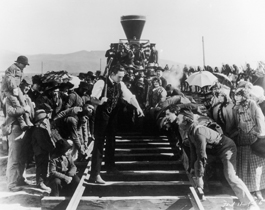home | metro silicon valley index | movies | current reviews | film review

RAIL TIME: The transcontinental railroad bridges the continent in John Ford's silent film 'The Iron Horse.'
Quiet Men
A new DVD set makes the case for director John Ford's silent days
By Richard von Busack
AUTEURISTS can't help crowing when they see a scene repeated throughout a director's work. One of the first shots of John Ford's 1920 Just Pals has a loafer (Buck Jones), lolling on straw, sleepily watching the haymakers through the sharply defined frame of a barn-loft door. The image must have stuck with Ford—the insider looking out—since he repeated it in his best film: John Wayne in a doorway, watching the world go its way in The Searchers.
So, does the new five-film, four-DVD set John Ford's Silent Epics, which includes Just Pals, Four Sons, The Iron Horse Hangman's House and Bad Men, have any interest except to scholars? The Iron Horse does indeed. This 1924 extravaganza concerns the making of the transcontinental railroad. The film is bookended by Abraham Lincoln: first as living next-door neighbor, last as sainted plaster bust. Lincoln's martyrdom overshadows the grand enterprise in the way JFK's ghost haunts the plan to send astronauts to the moon. Great men show up in the back of the frame—Buffalo Bill Cody, Leland Stanford, Wild Bill Hickok. The in-again, out-again hero, Davy (George O'Brien), is the grown-up version of the boy who carries his murdered father's dedication to blaze a trail for the railroad. Two different versions of this sprawler are included in the set; both carry the DNA of the Western movie intact. Some of it is silent kitsch: the "stage Oirish" clowning, the heroes kneading their hats in times of stress or romantic confusion. Here is the buffalo stampede, seen hoof-view from a low-angle pit. Here are the masses of cattle fording (or Fording) a river. Other details are keener: a saloon's back-bar mirror taken out of harm's way when a gun-fight is brewing, or the pussycat smile on a Native American warrior as he watches a white renegade carrying out a scalping. And there's something to be said (there always is) for being closer in time to the real thing. Ford's West existed fewer than 60 years from the event. In fact, the real-life locomotives that met in Promontory Point, Utah, the Jupiter and the #116, were hauled out for The Iron Horse. The kiss of cow-catchers is the most romantic moment in this epic.
Better on all counts is Four Sons, a little-known 1928 saga of war and immigration; Ford scholar Joseph McBride refers to this as a "slavish" imitation of Murnau, and it was filmed on some of the same sets as Sunrise. On its own, it's a tremendously watchable story of a family's loss through the war. A warm-hearted German village, home to a military garrison, is overwhelmed by the spike-helmeted overlords. An illiterate old woman loses son after son in the Great War. The Expressionist purity and the cutting-down of rumbustious chit-chat shows how much Ford had learned from Murnau. It also shows Ford's prime weakness. A schoolmaster, reading in a cafe, tells the mayor, "Books, Herr Burgermaster, are friends who never deceive." (The reverse of this depressingly simplistic idea is Edna O'Brien's proverb "Paper never refused ink.") Until that much-quoted line in The Man Who Shot Liberty Valance decades later, this faith in the lack of deception in a text is the perfect example of Ford's crippling faith in myth over reality.
JOHN FORD'S SILENT EPICS; four discs; 20th Century Fox Home Entertainment; $49.98.
Send a letter to the editor about this story.
|
|
|
|
|
|